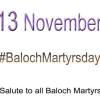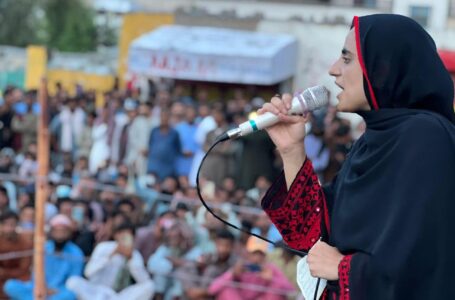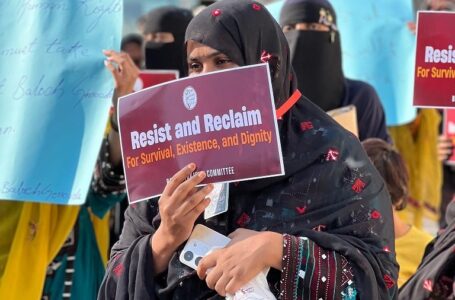FBM Holds Simultaneous Protests Against Pakistan’s Nuclear Tests on Baloch Land
13 November Baloch Martyrs’ Day

Baloch nation in Balochistan and around the world will be paying tributes to the great heroes of their liberation struggle on 13 November to mark the ‘Baloch Martyrs’ Day’. On this day the pro-freedom Baloch activists, parties and leaders will reiterate their determination to continue the resistance against ‘occupation of Balochistan’ because Balochistan was a sovereign state before the British invasion and subsequent division in 1839. The Baloch ruler Mir Mehran Khan Baloch was killed when the British imperialist forces attack his palace in Kalat Balochistan. Subsequently the British divided Balochistan into three parts giving the Western Part to Persia – modern day Iran – northern part of Afghanistan and the Eastern party remained semi-independent while having treating relations with British until 1947 when the British finally accepted its defeat and decided to leave the sub-continent.
The Eastern Balochistan – currently occupied by Pakistan – declared its full independence on 11 August, 1947 three days prior to Pakistan’s separation from united India. In a tripartite agreement, both the British and upcoming Pakistani administration, accepted the sovereign status of Balochistan as a free nation. However 227 days later the so called founder of Pakistan Mr M.A Jinnah asked the Baloch ruler to join Pakistan on the basis of shared religion. Both houses of Balochistan’s Parliament unanimously rejected the notion of joining Pakistan and informed Mr Jinnah of their joint decision. After this decision of the Baloch parliament Mr Jinnah order the military to attack Balochistan and invade it on gun point.
On 23 March, 1948 the Pakistani military attacked Balochistan parliament and captured all the elected members. The military also arrested the entire family of the Baloch ruler, the Khan of Kalat. However, the younger brother of the Khan of Kalat, Prince Abdul Karim Khan, managed to flee unharmed and went to Afghanistan, later in the same year he returned to Balochistan and lead the first Baloch resistance against the illegal occupation of Balochistan by Pakistan. The resistance against occupation which Prince Abdul Karim stated continues to this day. Pakistan conducted five brutal military operations in its effort to eliminate the Baloch resistance and freedom movement.
These operation were conducted on 1948, 1950s, 1962, 1973 and the 5th operation started in late 2000 when the ex-military chief dictator Musharraf declared war against Baloch. The fifth military operation has provoked the entire Baloch people and that is why the current resistance against Pakistani occupation is spread in every nook and corner of Balochistan. This time the Baloch freedom struggle against Pakistan is more organised and sophisticated, many Baloch analyst believe this could be the strongest push for an independent Baloch state. The leaders and activists of Baloch freedom movement are also adamant to continue their resistance till victory – regaining their sovereign status as a free nation.
Thousands of Baloch including women, children and elderly have been killed in each of these five operations but the state atrocities failed to break the resolve of Baloch people for their freedom. A Baloch Human Rights group the Voice for Baloch Missing Persons says that Pakistani security forces arrested and disappeared more than 18000 Baloch since the beginning of the fifth phase of the liberation struggle in year 2000. The VBMP also maintains that more than 2000 Baloch activists from the enforced-disappeared have been killed in custody by Pakistani security forces as part of their brutal policy ‘abducted, kill and dump’ policy. The brutally tortured, bullet ridden and often decomposed beyond recognition bodies of the victims of state’s kill and dumped policy were found dumped in different desolated areas across Balochistan and Karachi. Pakistan military and their hired criminal gangs have target killed more than 1500 Baloch since 2009.
The Baloch people have chosen 13 November as the ‘Baloch Martyrs’ Day or Remembrance day’ because of its historical significance and to honour the sacrifices of Mir Mehrab Khan, his comrades and every Baloch heroes who laid his or her life safeguarding the Baloch homeland and Baloch people against foreign invasion and aggression. The day of 13 November is also important in terms of unity of the different Baloch parties and organisations because when they stands united to remember the martyrs of liberation on ‘Baloch Martyrs’ Day’ it will give them a sense of realisation that if they stand united on every front, no power can defeat them and they can soon achieve their goal of an independent Balochistan for which thousands of Baloch man, women and children sacrificed their lives and thousands are still going through brutal torture of Pakistani and Iranian savage military in their prisons. Baloch national leader Hyrbyair Marri and his friends put 13 November as Baloch Martyrs’ Day in the proposed draft of Balochistan Liberation Charter which a practical step toward uniting the Baloch freedom movement.
Almost all the nations in world whether oppressed or independent pay tributes to their heroes because it is the blood of great heroes that made it possible for their nations to live a dignified and prosperous life. Freedom comes with a price and it is the fallen heroes who paid that price for the rest of the nation to live a happy and peaceful life. As it is said ‘a martyr’s death is the life of the nation.’ For this reason all nations of the world fought wars to get rid of the curse and darkness of slavery and every nation has dedicated a ‘Day of Remembrance’ to honour their heroes who fought for a bright future for their countries and people.
Like other nations the Tamil Ealam people too have dedicated a day the ‘Maaveerar Day or Heroes’ Day’ to commemorate the death of their fighters who fought for the freedom of Tamil homeland. A Tamil Liberation fighter, Shankar, is said to have died on this day in combat in 1982. Since then the Tamil people observes 27 November as their remembrance day each year in Tamil homeland and across the world.
It is hoped that this year and the years ahead the Baloch nation will stand united to remember the heroes of Baloch liberation struggle and to honour their sacrifices with the pledge to continue their mission till victory. To achieve this goal national unity is of utmost importance because until and unless a nation is united, the dream of becoming free will remain a wishful thinking and an empty slogan.










